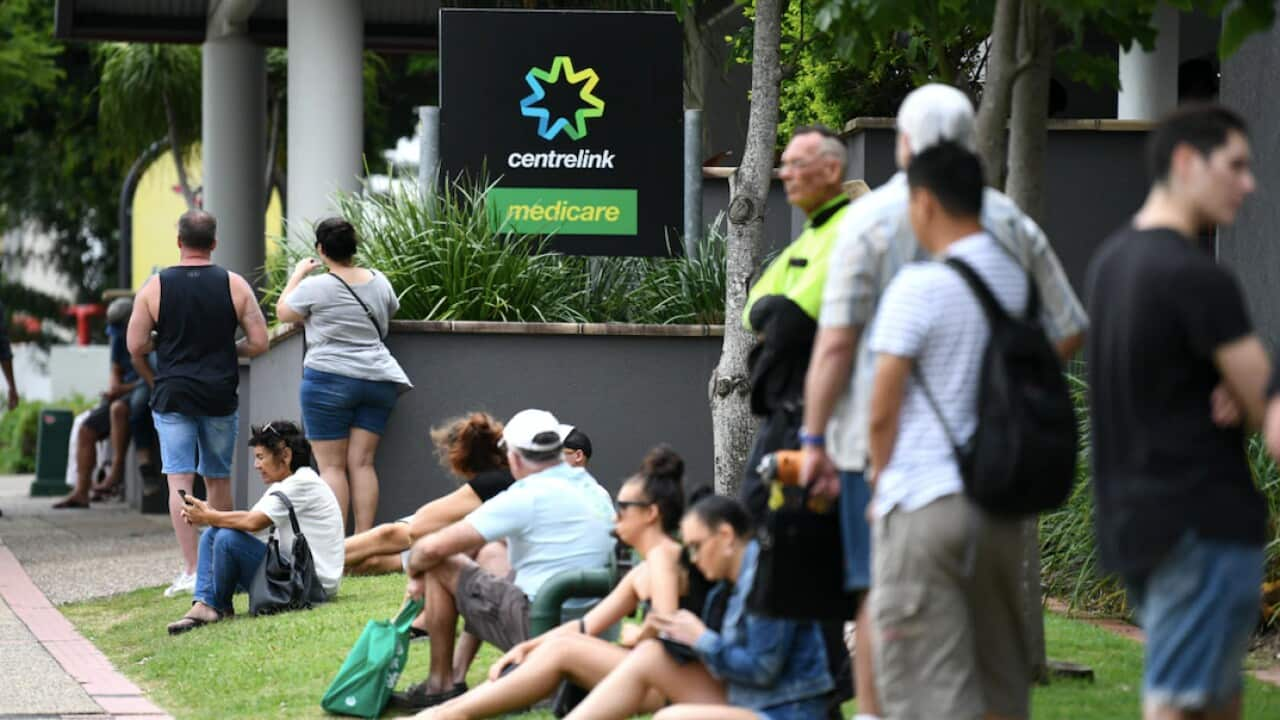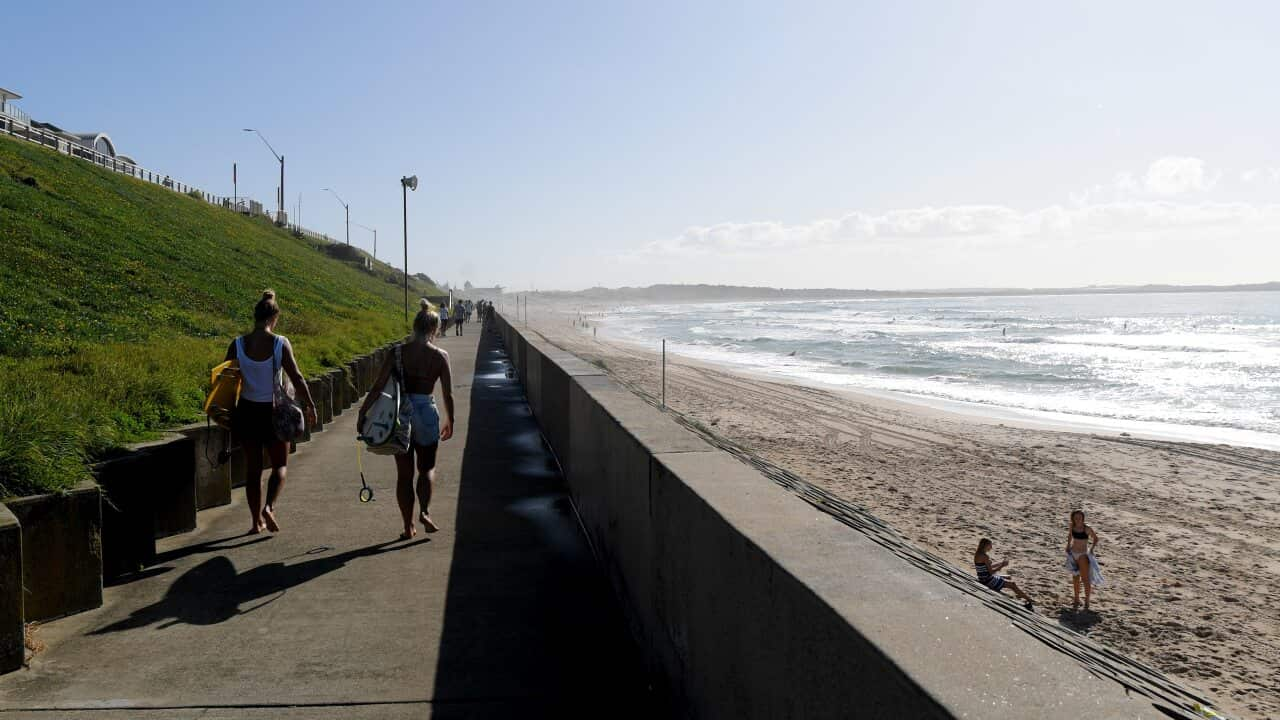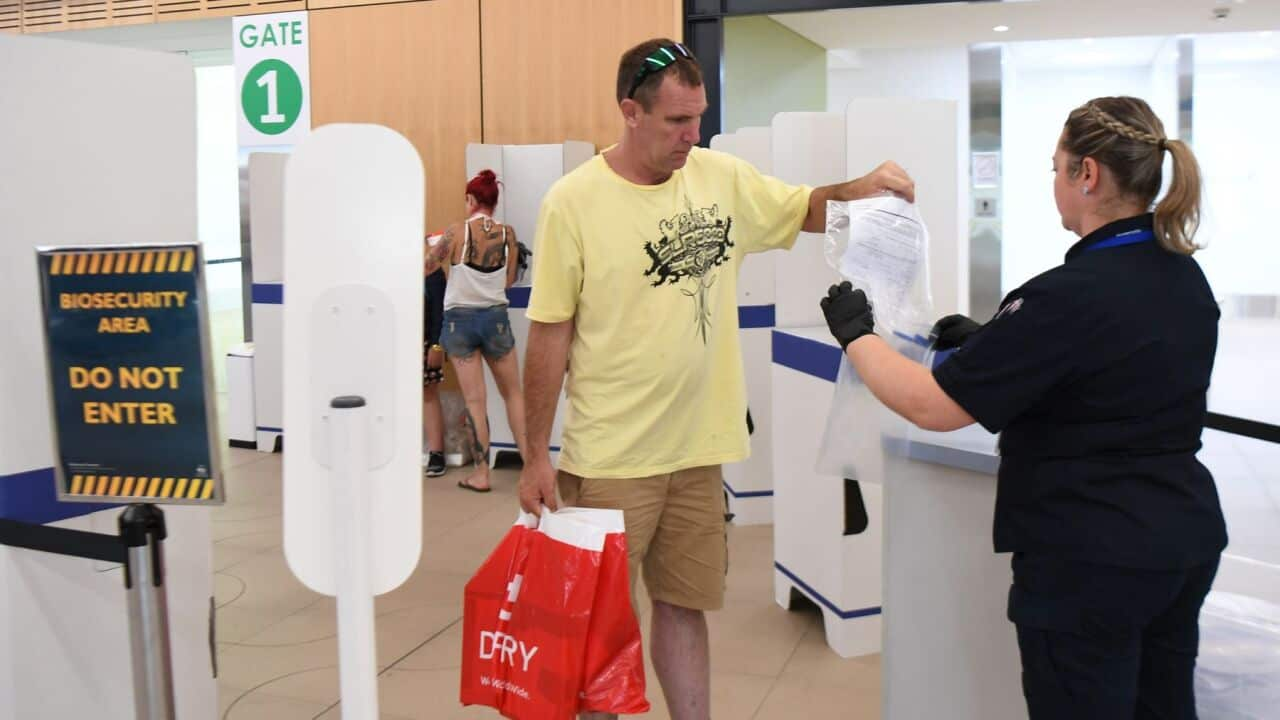Estudantes estrangeiros criticam o governo australiano por se sentirem abandonados.
Na sexta-feira, em coletiva à imprensa, o primeiro-ministro Scott Morrison já havia dito que era hora daqueles sem emprego - estudantes e pessoas com visto temporário - e também os turistas de ir de volta para casa.
Ontem, sábado de manhã, o ministro em exercício para a Imigração, Alan Tudge, repetiu e confirmou o que disse Scott Morrison, mas com mais nuances:
"We ask those foreign nationals who are here on temporary visas to continue looking after yourselves and if you're unable to do that, then to make arrangements to return home where you can get the support that you might need."
O governo então anunciou algumas mudanças temporárias para permitir que pessoas com vistos temporários de curta duração possam ficar na Austrália: aqueles que trabalham nas áreas da saúde, da agricultura, plantação e colheita, e no setor de processamento de alimentos.
O governo liberou o acesso aos fundos de previdência - superannuation - também para quem tem visto temporário, com algumas condições.
Mas Alan Tudge reforçou que aqueles sem os meios de se manter no país deveriam voltar aos seus países.
Matt Kunkel, do Centro de Imigrantes Irabalhadores, disse que o governo de Scott Morrison estava abandonando os mais de 1.100.000 pessoas com visto temporário ao não extender a eles o acesso a subsídios salariais e à ajuda e pagamentos de bem-estar social:
"I just think they're being wilfully ignorant to the real situation of these people. Many of the 1.1 million workers in this situation have no way to return to their countries of birth. There borders are closed, flights are cancelled and these temporary migrant workers are already living below the poverty line with no money to buy an airline ticket anyway."
Além destes trabalhadores, também os estudantes estrangeiros estão preocupados, com a maioria sem emprego e com cursos cancelados ou apenas online.
Muitos não tem dinheiro para pagar as passagens, agora com preços proibitivos, para voltar ao seu país, em meio ao cancelamento de voos, fronteiras dos países sendo fechadas e com suas famílias, também em confinamento, não conseguindo, em muitos casos, enviar dinheiro para a Austrália.
Entre os anúncios do governo deste sábado estão:
Working Holiday Visa:
O governo deu mais flexibilidade para quem tem o working holiday visa - visto de trabalho nas férias, com uma isenção dos 6 meses de limite de trabalho com um único empregador mas somente no caso de trabalharem nos setores da saúde, cuidado de idosos, de deficientes, de crianças, em creches e na agricultura.
Se for o caso, estas pessoas poderão extender o seu visto com um novo empregador.
Há que respeitar as regras de 14 dias de quarentena antes de viajar para o interior do país, a trabalho, e uma vez lá, respeitar o espaço de 4 metros quadrados por pessoa nos alojamentos.
O ministro federal da Agricultura, David Littleproud, disse que isso era vital para manter a segurança alimentar da Austrália, que depende destes trabalhadores temporários na época da plantação e também das colheitas:
"The fact you will see an influx of workers from other nations into your country to come and continue the agricultural supply chain is an important one and we are doing it with protocols that will keep you safe. So I say to everybody these are practical steps that we work with state and also industry officials to ensure we get the balance right."
Temporary Skilled Visa:
Pra quem tem visto temporário de trabalhador qualificado, o Temporary Skilled Visa, se perdeu o emprego tem 60 dias para achar outro patrocinador ou deixar a Austrália, mesmo que tenha poupança ou apoio financeiro da família.
Para aqueles que estão em licença sem vencimentos mas que não foram demitidos, ou que tiveram redução de horas de trabalho, isto não será considerado uma violação das condições dos seus vistos.
Eles poderão acessar até 10.000 dólares do seu fundo de previdência, o "superannuation", neste ano financeiro, que termina dia 30 de junho.
Estudantes estrangeiros:
Podem ficar no país se ainda tiverem emprego.
Se estiverem desempregados, sem apoio familiar e sem uma poupança, devem ir embora da Austrália.
Quem estiver trabalhando no setor de cuidado de idosos e como enfermeiros pode trabalhar mais de 20 horas por semana.
Podem acessar o seu fundo de previdência social, o "superannuation", caso estejam pelo menos há 12 meses na Austrália.
Os turistas devem voltar ao seu país, particularmente aqueles sem apoio familiar.
Enquanto isso, o vice-Médico-Chefe da Austrália, Paul Kelly, advertiu que o surto do coronavírus ainda não passou, apesar da diminuição no número de novos casos a cada dia.
"We're tracking quite well, that flattening of the curve we've talked about for quite some time now appears to be happening. But I really would caution against thinking we have got through this completely, because we definitely have not."
Mais de 5500 pessoas estão infectadas no país e 34 morreram.
As pessoas na Austrália devem ficar pelo menos a um metro e meio de distância dos outros e encontros estão limitados a duas pessoas, a não ser que esteja com a sua família ou em casa.
Se você acredita que pode ter contraído o vírus, ligue para o seu médico, não o visite, ou ligue para a Linha Direta Nacional do Coronavírus no número 1800 020 080.
Se você estiver com dificuldades para respirar ou sofrer uma emergência médica, ligue para 000.
A SBS traz as últimas informações sobre o coronavírus para as diversas comunidades na Austrália.
Notícias e informações estão disponíveis em 63 línguas no
"Coronavirus and Temporary Visa holders
The Government is making a number of changes to temporary visa holder arrangements during the coronavirus crisis in order to protect the health and livelihoods of Australians, support critical industries, and assist with the rapid recovery post the virus.
There are 2.17 million people presently in Australia on a temporary visa.
All were welcomed to Australia on a temporary basis for different reasons including to fill skills shortages; to study as full fee-paying international students; to visit family and friends; or to work and holiday.
They are an important part of our economy and society.
For example, there are over 8,000 skilled medical professionals on temporary visas supporting our health system right now.
While citizens, permanent residents and many New Zealanders have access to unconditional work rights and government payments (including the new JobKeeper and JobSeeker payments), temporary visa holders do not.
There has always been an expectation that temporary visa holders are able to support themselves while in Australia.
The changes announced today will help facilitate this for those who may be stood down or lose work hours as a result of the coronavirus.
In line with changes being made for Australian citizens and permanent residents, most temporary visa holders with work rights will now be able to access their Australian superannuation to help support themselves during this crisis.
Temporary visa holders who are unable to support themselves under these arrangements over the next six months are strongly encouraged to return home.
For these individuals it’s time to go home, and they should make arrangements as quickly as possible.
Changes are also geared toward enabling temporary visa holders to remain in key industries, such as health, aged and disability care, agriculture and food processing.
Importantly, they can help boost front line health numbers, get food from farms to our shops and ensure critical services continue.
Temporary visa holders are extremely valuable to the Australian economy and way of life, but the reality is that many Australians will find themselves out of work due to the dual health and economic crisis we’re currently facing, and these Australians and permanent residents must be the Government’s number one focus.
Visa changes
The following new measures will apply to the major classes of temporary visa holders.
The situation will be reviewed periodically and further changes made if required.
Visitor visa holders
There are 203,000 international visitors in Australia, typically on a visa lasting three months or less.
International tourists should return to their home country as quickly as possible, particularly those without family support.
Thousands are already doing this and others should follow their lead.
International students
There are 565,000 international students in Australia, mainly studying in the higher education or vocational education sector.
They are an important contributor to our tertiary sector and economy, supporting 240,000 Australian jobs.
Students are encouraged to rely on family support, part-time work where available and their own savings to sustain themselves in Australia.
As part of their visa application, international students have had to demonstrate that they can support themselves completely in their first year. Students who have been here longer than 12 months who find themselves in financial hardship will be able to access their Australian superannuation.
The Government will undertake further engagement with the international education sector who already provide some financial support for international students facing hardship.
For example, we understand there are some education providers that are providing fee discounts to international students.
The Government will also be flexible in cases where Coronavirus has prevented international students meeting their visa conditions (such as not being able attend classes).
International students are able to work up to 40 hours per fortnight.
International students working in aged care and as nurses have had these hours extended to support these critical sectors.
International students working in the major supermarkets had also had these hours extended to help get stock on shelves during the high demand.
From 1 May, their hours will return to the maximum 40 hours a fortnight as more Australians are being recruited into these roles.
New Zealanders on 444 visas
New Zealanders and Australians have reciprocal arrangements whereby we can each stay and work in each other’s country.
There are more than 672,000 New Zealanders in Australia on a subclass 444 visa.
New Zealanders who are on 444 visas and arrived before 26 February 2001 will have access to welfare payments and the JobKeeper payment.
444 visa holders who arrived after 2001 have access to the JobKeeper payment.
They do not have access to JobSeeker or other welfare payments.
New Zealanders should consider returning to New Zealand if they are unable to support themselves through these provisions, work or family support.
Temporary Skilled visa holders
There are around 139,000 temporary skilled visa holders, on either a 2 year or 4 year visa.
They were provided the visa to fill a skills shortage – a shortage that may still be present when the crisis has passed.
Consequently, those visa holders who have been stood down, but not laid off, will maintain their visa validity and businesses will have the opportunity to extend their visa as per normal arrangements.
Businesses will also be able to reduce the hours of the visa holder without the person being in breach of their visa condition.
These visa holders will also be able to access up to $10,000 of their superannuation this financial year.
Those visa holders who have been laid off due to coronavirus should leave the country in line with existing visa conditions if they are unable to secure a new sponsor.
However, should a 4-year visa holder be re-employed after the coronavirus pandemic, their time already spent in Australia will count towards their permanent residency skilled work experience requirements.
Working holiday makers supporting critical sectors
There are about 118,000 people in Australia on a Working Holiday visa (or backpacker visa) – a visa which provides conditional work rights.
To support the critical sectors of heath, aged and disability care, agriculture and food processing, and childcare, some limited flexibility will be provided.
In particular, working holiday makers who are working in these critical sectors will be exempt from the six month work limitation with the one employer and eligible for a further visa to keep working in these critical sectors if their current visa is due to expire in the next six months.
In general, working holiday makers that do not have the confidence to sustain themselves over the next six months should make arrangements to leave the country.
There are another 185,000 other temporary visa holders in Australia, about half of them temporary graduate visa holders.
They will also be able to access their Australian superannuation if needed for support.
Further announcements will be made with the Deputy Prime Minister and Agriculture Minister in relation to supporting the agricultural sector, including the operation of the Seasonal Worker Program and Pacific Labour Scheme."















